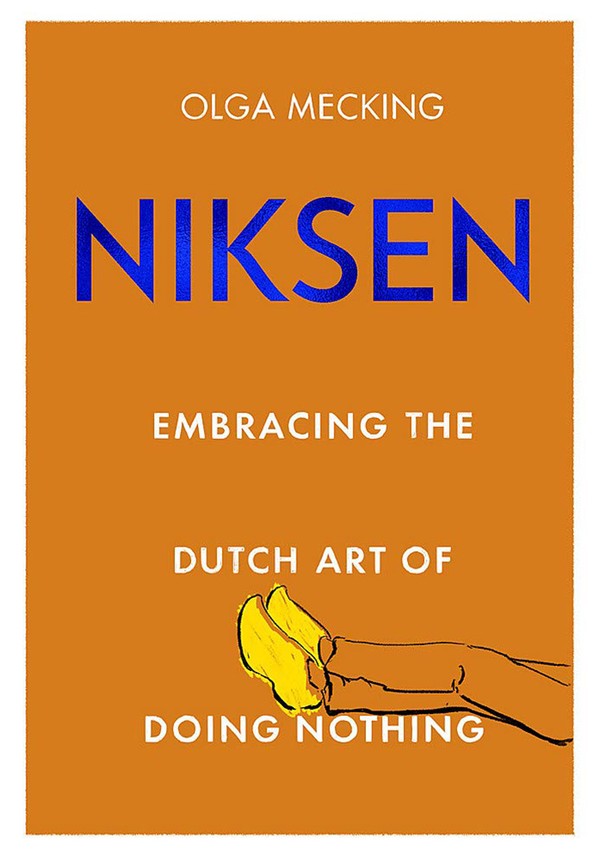
9 Lessons We Can Learn From The Dutch
Get Comfortable With The Idea Of ‘Nothing-ing’
Don’t be fooled – when Mecking says practising the art of Niksen means doing, literally, nothing, she means it. In the opening chapters of the book she paints the following scenario: “I’m sitting on my wonderfully comfortable brown couch. There is a mug of hot, steaming tea in my hands and I have my fingers interlaced around it, feeling the warmth.” She goes on to describe having her Kindle beside her, or perhaps an article she’s been meaning to read. The problem here, she says, is that it’s clear she’s either reading or working. Niksen, she explains, is not sitting on the coach thinking about work or planning dinner, or mentally checking that your children have everything they need. Instead, she says, picture this: “I’m on the couch. I’m looking at my rug when my gaze moves towards the garden and I notice the roses are still blooming despite the cold weather. My husband has put on some music and I’m listening to the singer’s voice and the beat of the drums.” That, she says, is Niksen. Forget mindfulness, browsing social media or even watching TV – none of these ‘activities’ qualify as Niksen.
Take The Time To Understand Yourself
To be comfortable with the art of Niksen, and truly understand what makes the Dutch such happy people, Mecking explains that self-awareness and deep knowledge about your personal traits is key – even more so when it comes to building happy, healthy relationships with others. She relies heavily on the wisdom of Gretchen Rubin, author of The Happiness Project to explain her point. “We need deep enduring bonds, we need to be able to confide, we need to feel like we belong,” Rubin says. “We need to be able to get support and, just as important for happiness, give support to others.” But Mecking adds that healthy relationships require a self-awareness – something Rubin agrees with. “We have to know what our own interests are, our own values, our own temperament,” she says. “It is only when we know ourselves that we can shape our lives in a way that will further our own happiness.” Conversely, Mecking says, other nationalities – like the British and the Americans – focus too much on ‘attaining’ happiness, which usually only results in making them more miserable.
Don’t Buy Into Extreme Deprivation
In other societies, says Mecking, constant berating over health, diet and fitness only engenders feelings of failure – which won’t build the foundations for a happy life. Instead, the Dutch rarely deprive themselves – indeed, she describes them as one of the most “sugar-crazy” groups of people on the planet. But everything is done with an air of accountability and moderation. “The Dutch like to indulge sometimes,” she says. “But responsibly: not too often and not too much.” In addition, the Dutch treat their food with seasonality, which means certain treats are only enjoyed at certain times of the year – not year-round and at the click of a button like in other cultures. Statistically, this attitude has paid off – the Netherlands has one of the highest life expectancies in Europe.
Believe In ‘To Each Their Own’
According to Mecking, a typical Dutch trait is ‘verzuiling’ or pillarisation, more colloquially known as ‘to each their own’. She admits that this tendency to separate hasn’t always encouraged positive divides (indeed, religious segregations in the past would not be looked on favourably these days) but the underlying principle of ‘to each their own’ has fed into the Dutch attitude of ‘live and let live’ and higher levels of tolerance and inclusivity. As Ben Coates, author of Why The Dutch Are Different says: “Everyone has a right to be heard and have an opinion and have that opinion valued, even the children.”
Cherish Your Children While They’re Young
Speaking of children, the way Dutch parents treat their kids directly feeds into their attitude to life, and explains why Dutch children are understood to be some of the happiest in the Western world. “One reason is that the Dutch have such a strong support network in place to help with their children through day care, government-funded child support and paid maternity leave,” explains Mecking. But there’s also something about the way in which they parent their children. Most of the time, says Mecking, you won’t find Dutch parents shouting at their children or telling them off in an angry and public manner. Instead, they try to explain to their kids why the behaviour is unacceptable and ask them questions to see if they understand. Mecking defers to parenting expert Catharina Haverkamp to elaborate: “Dutch people consider childhood to be a very important time,” says Haverkamp. “They have quite romantic ideas about childhood. Be in nature, go outside, be free, explore your life. And these are some of the things that make children in the Netherlands happy.” Beyond that, men in the Netherlands tend to work a four-day week to spend more time with their families, while mealtimes are typically earlier in the evening to ensure parents eat with their kids every day.
Forget The Pursuit Of Perfection
As for women, says Mecking, there’s plenty of freedom and choice in the Netherlands, but expectations around perfection – especially in terms of appearance – often make way for practicality and function, which explains why Dutch women are so content. “Women dress for comfort and practicality rather than to stun the onlooker,” explains Mecking. “And dressed in their jeans and trainers they are direct and outspoken, with a strong sense of personal empowerment.” Finally, Mecking explains that Dutch women often accept that caring for children is their responsibility, but caring for ageing parents should fall to the government, thereby alleviating some of the modern-day stresses felt by women in the UK and elsewhere. “State-run homes for the elderly are a fact of life and accessible for all,” adds Mecking. Instead of trying to care for extended family, the Dutch tend to zero in on the nuclear family, making day-to-day responsibilities far more reasonable – especially as men are expected to carry an equal load.
Resist ‘Busy’ Culture
If you’re going to take one thing from Mecking’s book, it’s that in order to nail Niksen, you have to resist the culture of ‘busyness’. “If you’re doing nothing, own it,” she says. “Be unapologetic about taking breaks or holidays, and if you start to feel guilty about being seen as lazy, think of Niksen not as a sign of laziness but as an important life skill that might help you regain some composure, find calm and prevent burnout.” She admits it isn’t easy to do, especially as humans, we’re hardwired to live in a hurry. The key, she and others argue, is to surround yourself with like-minded individuals and work and rest according to your natural rhythm (something the new working from home model has all granted us more flexibility around).
Learn To Manage Your Expectations
While Niksen largely depends on your ability to relax fully at home, it’s understandable if home is often a frantic environment for you – especially if you have children or other people who depend on you. “Remember: chores, child-rearing and relationships are all work, so you’re just as entitled to breaks as when you’re at an office job,” argues Mecking. But that said, don’t beat yourself up if Niksen doesn’t come easy to you right off the bat. “Learning takes time and effort so don’t become discouraged if you don’t take to Niksen immediately. Know that sitting around doing nothing might actually feel uncomfortable at first, and that’s okay.” To help, Mecking suggests re-organising your environment and removing distractions like your television or other devices, and get your children involved in the practice, too. While hiring someone to help out round the house might not be in everyone’s budget, if you can make it work, you might be surprised at what it can do for your wellbeing. Finally, if practising Niksen at home just isn’t possible, consider finding an alternative place (maybe outdoors) where you can go to be alone and do nothing.
Recognise When Niksen Isn’t Right
Depending on your individual background or culture, Niksen might not be an option – full stop. But there are other circumstances where it’s not appropriate, either, says Mecking. “Often those suffering with depression have very little energy and may struggle just to get out of bed, and for some Niksen can be counterproductive,” explains Mecking. Equally, you might work somewhere where your boss keeps a close eye on your activity. “In such cases, doing nothing could have serious repercussions for you,” admits Mecking. “You risk being reprimanded for even sacked. This is not a risk worth taking if you need to pay the rent and keep your family fed and clothed.” Finally, if you’re not sure there’s anything wrong with your life, Mecking says Niksen may not be necessary. “If that’s the case that’s great because it means that you like your life as it is and don’t want to change it.” Remember, your perception of stress is always going to be different to anyone else’s, so what works for you is bound to work differently for someone else. To each, their own.
Niksen: Embracing The Dutch Art Of Doing Nothing by Olga Mecking is available from Waterstones.com
Visit OlgaMecking.com for more information.
DISCLAIMER: We endeavour to always credit the correct original source of every image we use. If you think a credit may be incorrect, please contact us at info@sheerluxe.com.


